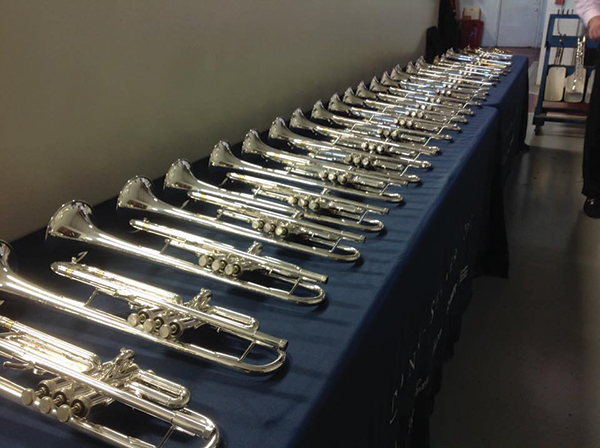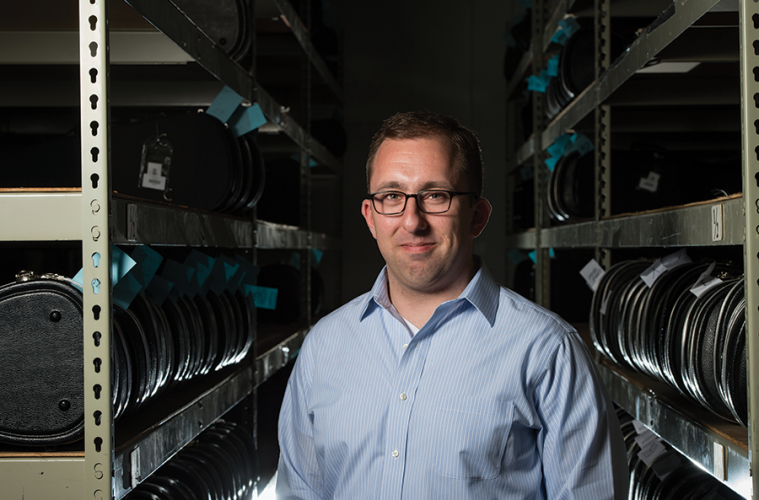Unlike the owners of most musical instrument stores, Randy Shayler is not a musician. Beyond some childhood piano lessons and a stint playing clarinet in the school band from fifth to ninth grade, Shayler has no musical background to speak of. What he does have, however, is a strong knowledge of business and finance that, combined with the more musical backgrounds of Zeswitz Music’s 32 employees, has helped make the 94-year-old store stronger than ever.
“When I graduated from the MBA program at Harvard Business School, I founded a private equity fund with the mission to find, acquire and operate a family-owned business. I was especially interested in purchasing one from an owner looking to retire,” explained Shayler.
He was originally interested in the construction equipment rental industry before coming upon Zeswitz Music in 2013. The store was originally founded by luthier and violin maker William Zeswitz Sr. in 1923, as a one-person enterprise, and the Zeswitz family went on to be a pioneer in the instrument rental and school services business before selling to the Brook Mays conglomerate in the early 2000s. Following Brooks Mays’ bankruptcy, the store was sold to Rayburn Music of Boston, from which Shayler purchased it.
Zeswitz Music
100 Gibraltar Road
Reading, PA 19606
877.480.8224
zeswitzmusic.comMon. – Thu. 10 a.m. – 7 p.m.
Fri. 10 a.m. – 6 p.m.
Sat. 10 a.m. – 4 p.m
Randy Shayler, CEO
In the four years since taking over as CEO of Zeswitz Music, Shayler has worked hard to strengthen and streamline the store’s business model, making sure it offers the best possible products and services to their clients.
“We’ve worked hard to improve the quality of instruments we rent, reduced the time it takes to fix broken instruments, improved the reliability of repairs and increased responsiveness to parents,” said Shayler, who generates School Service Report Cards in order to track and share these metrics with schools in more than 50 school districts in Pennsylvania, New Jersey and Maryland.
“Our philosophy is that if we do our best to support educators’ success with their students, all our business objectives will take care of themselves,” Shayler continued. “We do this even when it’s not profitable. For example, we offer repair turnaround time guarantees to our educators, and if we miss one of our self-imposed deadlines, the repair is free.”
“We don’t miss very many deadlines,” Shayler continued, “but when we do, we don’t think we earned our fees, so we don’t charge.”
The initiative has helped to keep the Zeswitz repair staff on schedule, as Shayler estimates that last spring, 99.9 percent of its instrument repairs were completed in two weeks or less, and less than half of a percent of their repairs were returned as defective.
Repairs are a lucrative part of the Zeswitz business model, but the most successful segment is instrument rentals, which make up 80 percent of the store’s revenue. “In the fall of 2013, we started 4,300 new rentals. This fall, we’re on pace to start around 6,600, and we expect to have around 13,000 instruments on active rentals this year,” said Shayler. “That’s 53-percent growth, which has far exceeded our expectations. I wasn’t sure how quickly we could grow a company during its 10th decade in business, but I’m thrilled with our progress. We’ve certainly taught this old dog some new tricks.”

Zeswitz Music just added the 18,000th instrument to its rental fleet — let the trumpets blare!
An area that makes up surprisingly little of Zeswitz’s revenue is retail sales. “Whereas the company used to be very focused on its retail storefront, today our single 23,000-square-foot location is mostly warehouse space for our instrument fleet,” said Shayler. “In large part, the physical business is used to house inventory that the education representatives need for their music educators. Most of our customers never visit our location, simply because they don’t need to.”
Instead, the focus is on weekly service at schools, creating valuable face-to-face time with educators. In addition, Zeswitz Music holds many events for educators and students to interface with the store’s employees and gain firsthand access to the instruments. These include a “pro show” taking place each holiday season to encourage students to upgrade their instruments, as well as a twice-yearly Music Educator Symposium, which invites music educators from surrounding districts to participate in a day of professional development and continuing education.
“We recruit presenters and clinicians from near and far to provide insights and best practices that educators can use to increase their impact on students,” explained Shayler. “It’s free of charge to educators, and it’s our way of helping them sharpen their skills.”
Zeswitz reps can also be found holding instrument petting zoos at their various schools. “When students in our schools come of age musically, we bring in the instruments, and the kids and their parents get to see, touch and test them,” said Shayler, who serves on the board of directors of the Reading Musical Foundation. “It’s exciting to watch their reactions and see the teachers encourage artistic opportunities.”
Looking ahead, Zeswitz Music is committed to serve even more school districts and continue its mission to promote music education, whether it be through its various accounts or through sponsoring programs, such as the Reading Musical Foundation’s Operation Replay program, which accepts donated instruments from the community, refurbishes them and provides them to students in local schools who otherwise would not be able to afford to play.
“Over the last four and a half years, we’ve built a structure of systems and processes around what we do best, and that’s helped us to do it even better,” said Shayler. “Internally, we talk a lot about the difference between being a caterer and being a short-order cook. Like a short-order cook, there are still some things we have to do on demand to be responsive and serve special needs, but we want to be the kind of company that’s reliable, dependable, and efficient enough to make a big impact and serve a big market.”


